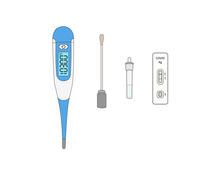Rapid diagnostic test

A rapid diagnostic test (RDT) is a medical diagnostic test that is quick and easy to perform. RDTs are suitable for preliminary or emergency medical screening and for use in medical facilities with limited resources. They also allow point-of-care testing in primary care for things that formerly only a laboratory test could measure. They provide same-day results within two hours, typically in approximately 20 minutes.[1][2]

The European Union defines that a rapid test means qualitative or semi-quantitative in vitro-diagnostic medical devices, used singly or in a small series, which involve non-automated procedures and have been designed to give a fast result.[3]
Lateral flow tests are probably the most known type of rapid diagnostic tests,[4] similar to pregnancy tests, but there exist other systems as dipsticks, vertical flow, etc. Anything that can be used at bedside (point-of-care) of the patient. Emerging lateral flow technology, the Cornell FeverPhone, has been validated to differentiate causes of acute febrile illness such as Dengue Virus,[5] Chikugunya Virus[5] and Malaria[6] using a single drop of blood in about 15 minutes.[7]

Examples
[edit]Some examples of RDTs are listed below:
- Rapid antibody tests
- Rapid antigen tests
- Rapid COVID-19 test
- Rapid influenza diagnostic test
- Malaria antigen detection tests
- Rapid strep test
- Rapid urease test
- NEMIS Rapid pathogen screening test
See also
[edit]References
[edit]- ^ "Simple / Rapid tests". WHO. Retrieved 19 July 2014.
- ^ "Rapid Diagnostic Tests: How They Work". CDC. Retrieved 19 July 2014.
- ^ 2009/886/EC: Commission Decision of 27 November 2009 amending Decision 2002/364/EC on common technical specifications for in vitro diagnostic medical devices
- ^ Quesada-González, Daniel; Merkoçi, Arben (2015). "Nanoparticle-based lateral flow biosensors". Biosensors & Bioelectronics. 15 (special): 47–63. doi:10.1016/j.bios.2015.05.050. hdl:10261/131760. PMID 26043315.
- ^ a b Lee, S; Mehta, S; Erickson, D (September 2, 2016). "Two-Color Lateral Flow Assay for Multiplex Detection of Causative Agents Behind Acute Febrile Illnesses". Anal Chem. 88 (17): 8359–8363. doi:10.1021/acs.analchem.6b01828. PMC 5396465. PMID 27490379.
- ^ Kim, J; Cao, XE; Finkelstein, JL; Cárdenas, WB; Erickson, D; Mehta, S (September 18, 2019). "A two-colour multiplexed lateral flow immunoassay system to differentially detect human malaria species on a single test line". Malar J. 18 (1): 313. doi:10.1186/s12936-019-2957-x. PMC 6749696. PMID 31533756.
- ^ Friedlander, Blaine (June 21, 2016). "NIH provides $2.3M grant for FeverPhone development". Cornell Chronicle. Retrieved February 16, 2023.
